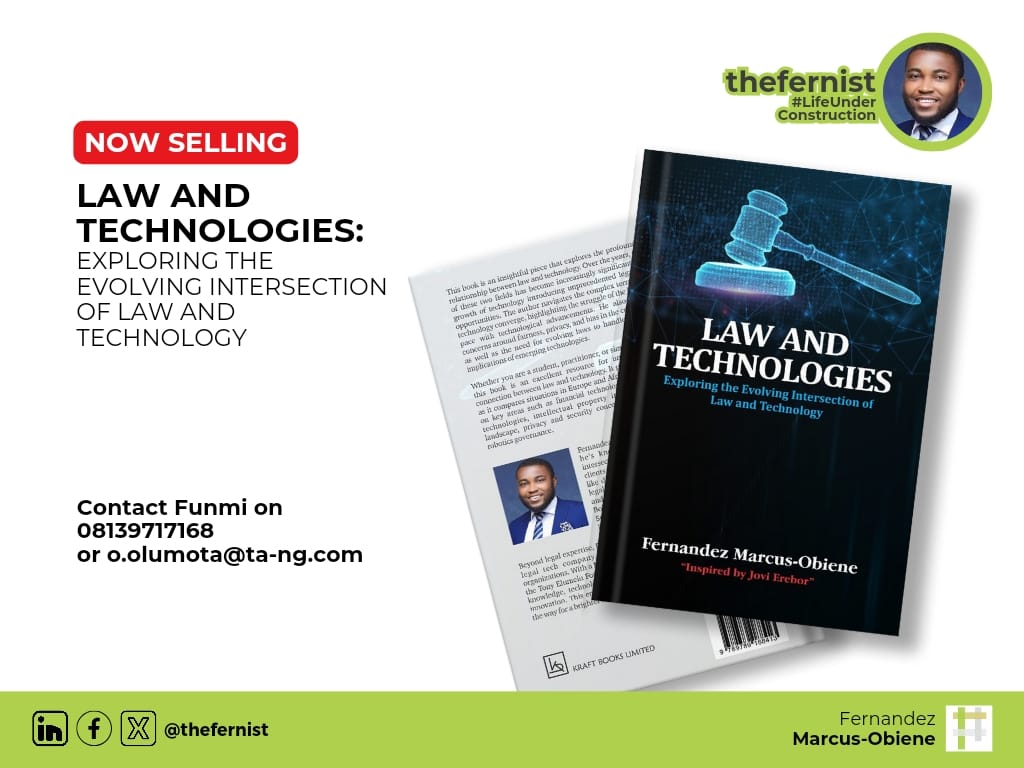“Law and Technologies: Exploring the Evolving Intersection of Law and Technology” by Fernandez Marcus-Obiene is a timely and comprehensive exploration of the complex relationship between legal frameworks and technological advancements. Marcus-Obiene deftly navigates through various critical areas where law and technology intersect, offering readers a deep understanding of the challenges and opportunities that arise in our rapidly digitalizing world.
The book stands out for its balanced approach, addressing both the potential benefits of technological innovations in the legal sphere and the ethical and regulatory challenges they present. From financial technology to artificial intelligence, from gamification in law to intellectual property rights in the digital age, Marcus-Obiene leaves no stone unturned.
What makes this work particularly valuable is its global perspective, drawing comparisons between approaches in Europe, the United States, and Nigeria. This comparative analysis provides readers with a nuanced understanding of how different jurisdictions are grappling with similar technological challenges.
“Law and Technologies” is an essential read for legal professionals, policymakers, and anyone interested in understanding how technology is reshaping our legal landscape. It serves not only as an informative guide but also as a call to action for proactive engagement with the opportunities and challenges that lie at the intersection of law and technology.
Chapters and Subchapters:
Chapter 1: Law and Technologies: Challenges and Opportunities
– Introduction
– Technology Defined
– Law Defined
– Opportunities and Challenges
– Technology Applied to Law
– Law Reacting to Technology
– Regulatory Responses to Technology
– Why Regulate Technology?
– Challenges with Regulating Technology
Chapter 2: Regulation of Financial Technology
– What Is Financial Technology or FinTech?
– Banking Before and with FinTech
– Risks Associated with FinTech
– The Concept of Electronic Payments and Its Legal Basis
– Forms of Electronic Payments
– Payment Institutions
– Electronic Money (e-money)
– The Risk in E-payments
– International Settlements and Corresponding Banking
– Money Laundering Prevention
Chapter 3: Legal Semantic Technologies
– Introduction to Legal Semantic Technologies
– What Is Semantics?
– What Is Semantic Technology?
– Semantic Web in Open Government Data
– Semantic Web and the Law
– Towards Standardization
– Rules As Code
Chapter 4: Games and Gamification Methods for Law
– Introduction
– What Are Games?
– What About Gamification?
– Motivation Theories in Gamification
– Gamification Psychology
– Player Types in Gamification
– Criticism of Gamification
– Boosting Law Obedience and Compliance through Gamification
– The Future of Gamification
– Gamification Applied to Law
Chapter 5: Intellectual Property and Modern Technologies
– Introduction
– Intellectual Property Fundamentals
– Introduction to Intellectual Property Rights in Data and Databases
– Data Licensing
– Patents and Data-Driven Inventions
– Domain Names
– Privacy, Data Protection, and Intellectual Property
– Blockchain and IP
– Trademarks and Technology
Chapter 6: Privacy, Security and Technology
– Introduction
– Understanding Privacy in the Digital Era
– Types of Privacy
– Data Privacy Regulations and Laws
– Personal Data
– Data Breaches and Cybersecurity Risks
– The Role of Technology in Privacy Protection
– Surveillance, Privacy, and Civil Liberties
– Legal and Ethical Considerations
– Future Trends in Privacy and Security
Chapter 7: Artificial Intelligence, Robotics and Law
– Introduction
– Definitions and Overview
– Current State and Applications
– Ethical and Legal Challenges
– Regulatory Landscape
– AI and Robotics Today
– AI in Healthcare and Medicine
– AI in Criminal Justice and Law Enforcement
– AI in Autonomous Systems
– AI, Privacy, and Human Rights
– Future Prospects and Recommendations
– Artificial Intelligence in Law Practice
– Artificial Intelligence in the Judiciary
– Opportunities for Lawyers
– Legal Issues and Opportunities
– Ethical Concerns with the Use of AI for Law Practice
To get your copy:
Contact: Funmi
Phone: +234 813 971 7168
Email: [email protected]
Or use this link: https://wa.link/iev4qp
Don’t miss this opportunity to be part of the conversation shaping our digital future. Order your copy today!
ABOUT THE AUTHOR
Fernandez Marcus-Obiene, or “The Fernist” as he’s known, is a leading voice at the intersection of law and technology. He is currently the Special Assistant to the President on Justice Sector Reform and ICT/Digital and Innovative Technology and works with the Attorney General of the Federation and Minister of Justice on various reform initiatives.
Fernandez is also the Chairman of the Technology and Law Committee of the Nigerian Bar Association Section on Legal Practice. He has an LLM Degree in LegalTech from Mykolas Romeris University, Vilnius, Lithuania and has several law and technology certifications and memberships. He is also a member of the Hague Institute for Innovation in Law (HiiL) National Core Convening Group.
Fernandez is a Partner (now on leave of absence) at Tsedaqah Attorneys, a full service law firm with offices in Lagos, Port Harcourt, Abuja and Accra through which he advises and represents clients in various transactions relating to technology. He also cofounded a LegalTech startup, wekrea8.com that provides technology solutions for lawyers.




